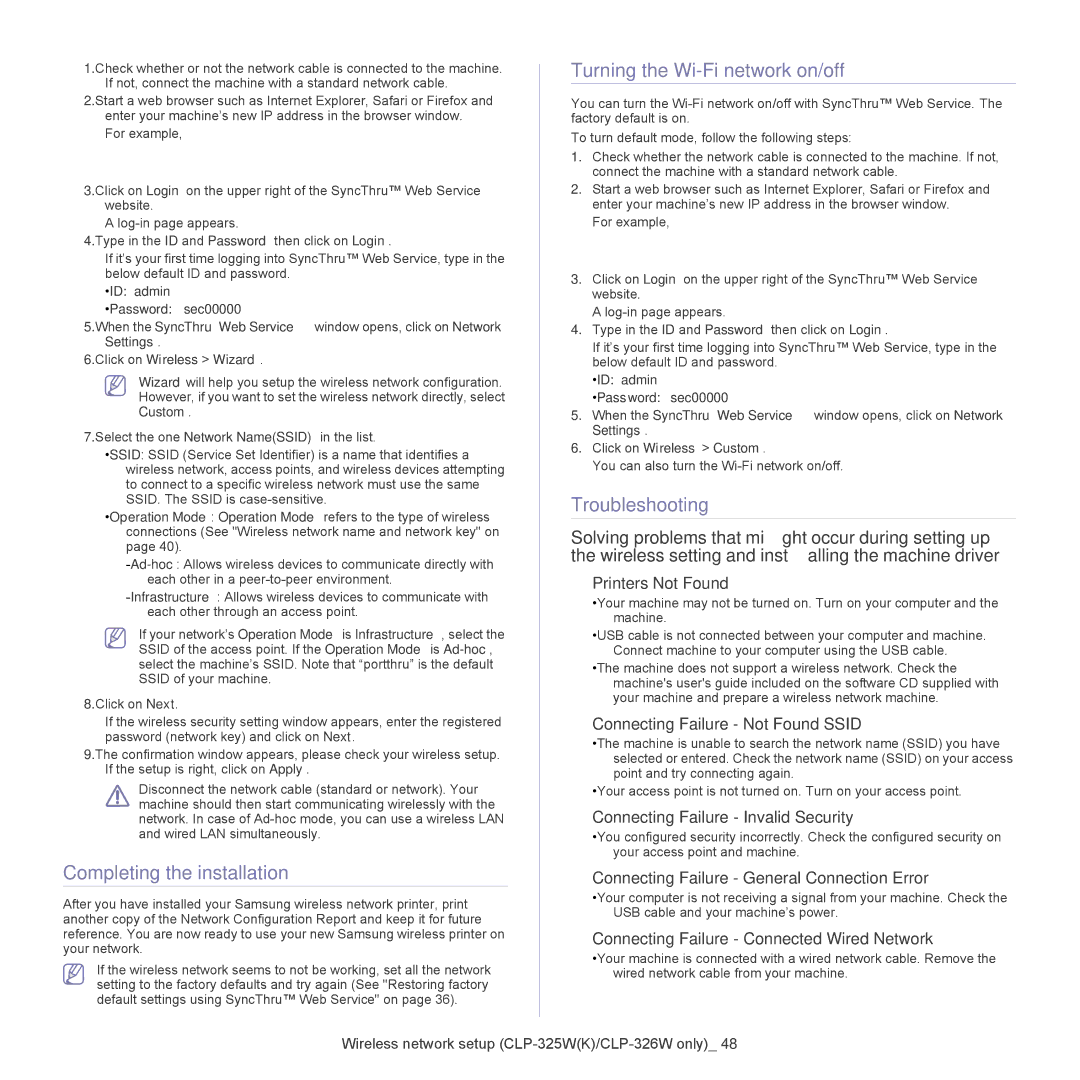
1.Check whether or not the network cable is connected to the machine. If not, connect the machine with a standard network cable.
2.Start a web browser such as Internet Explorer, Safari or Firefox and enter your machine’s new IP address in the browser window.
For example,
3.Click on Login on the upper right of the SyncThru™ Web Service website.
A
4.Type in the ID and Password then click on Login.
If it’s your first time logging into SyncThru™ Web Service, type in the below default ID and password.
•ID: admin
•Password: sec00000
5.When the SyncThru™ Web Service window opens, click on Network Settings.
6.Click on Wireless > Wizard.
Wizard will help you setup the wireless network configuration. However, if you want to set the wireless network directly, select Custom.
7.Select the one Network Name(SSID) in the list.
•SSID: SSID (Service Set Identifier) is a name that identifies a wireless network, access points, and wireless devices attempting to connect to a specific wireless network must use the same SSID. The SSID is
•Operation Mode: Operation Mode refers to the type of wireless connections (See "Wireless network name and network key" on page 40).
If your network’s Operation Mode is Infrastructure, select the SSID of the access point. If the Operation Mode is
8.Click on Next.
If the wireless security setting window appears, enter the registered password (network key) and click on Next.
9.The confirmation window appears, please check your wireless setup. If the setup is right, click on Apply.
Disconnect the network cable (standard or network). Your machine should then start communicating wirelessly with the network. In case of
Completing the installation
After you have installed your Samsung wireless network printer, print another copy of the Network Configuration Report and keep it for future reference. You are now ready to use your new Samsung wireless printer on your network.
If the wireless network seems to not be working, set all the network setting to the factory defaults and try again (See "Restoring factory default settings using SyncThru™ Web Service" on page 36).
Turning the Wi-Fi network on/off
You can turn the
To turn default mode, follow the following steps:
1.Check whether the network cable is connected to the machine. If not, connect the machine with a standard network cable.
2.Start a web browser such as Internet Explorer, Safari or Firefox and enter your machine’s new IP address in the browser window.
For example,
3.Click on Login on the upper right of the SyncThru™ Web Service website.
A
4.Type in the ID and Password then click on Login.
If it’s your first time logging into SyncThru™ Web Service, type in the below default ID and password.
•ID: admin
•Password: sec00000
5.When the SyncThru™ Web Service window opens, click on Network Settings.
6.Click on Wireless > Custom.
You can also turn the
Troubleshooting
Solving problems that might occur during setting up the wireless setting and installing the machine driver
Printers Not Found
•Your machine may not be turned on. Turn on your computer and the machine.
•USB cable is not connected between your computer and machine. Connect machine to your computer using the USB cable.
•The machine does not support a wireless network. Check the machine's user's guide included on the software CD supplied with your machine and prepare a wireless network machine.
Connecting Failure - Not Found SSID
•The machine is unable to search the network name (SSID) you have selected or entered. Check the network name (SSID) on your access point and try connecting again.
•Your access point is not turned on. Turn on your access point.
Connecting Failure - Invalid Security
•You configured security incorrectly. Check the configured security on your access point and machine.
Connecting Failure - General Connection Error
•Your computer is not receiving a signal from your machine. Check the USB cable and your machine’s power.
Connecting Failure - Connected Wired Network
•Your machine is connected with a wired network cable. Remove the wired network cable from your machine.
Wireless network setup
